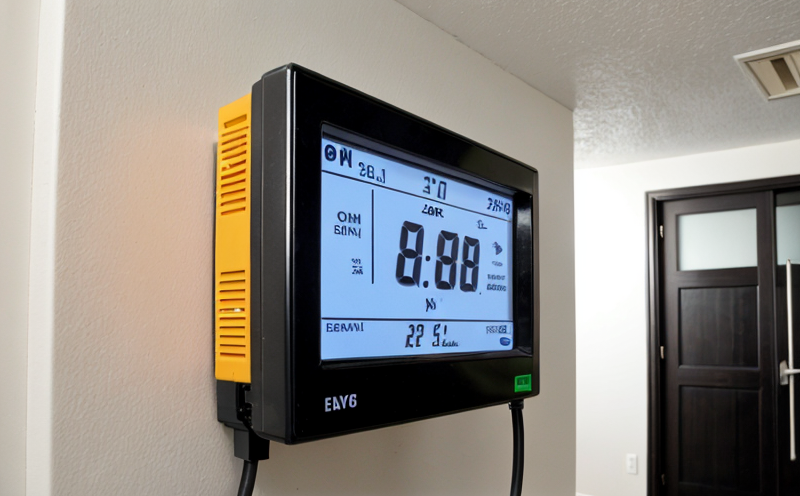EN 50564 Standby Power Testing of Electrical Products
The European standard EN 50564 focuses on the energy consumption during standby mode for electrical products. This testing is crucial for manufacturers aiming to comply with EU regulations and improve their product's environmental impact. The standard covers a wide range of household appliances, office equipment, and other devices that are typically left in standby mode.
Standby power refers to the electricity consumed by electronic devices when they are not actively performing their main function but remain plugged into an outlet. This non-operational consumption can add up significantly over time, contributing to higher energy bills and increased greenhouse gas emissions. By testing products against EN 50564, manufacturers ensure that their appliances consume minimal power in standby mode.
The standard provides detailed guidelines on how to measure the standby power consumption of electrical devices. It requires the use of specific measurement equipment and defines clear acceptance criteria for different classes of products. The testing process involves simulating real-world conditions where devices are left in standby, ensuring that any discrepancies are captured accurately.
EN 50564 is not just a compliance requirement but also an opportunity for manufacturers to enhance their product's market competitiveness. By reducing standby power consumption, companies can offer more environmentally friendly products, which align with global sustainability goals and consumer preferences. This testing contributes to the broader objective of minimizing energy waste in everyday life.
The standard is regularly updated to reflect advancements in technology and changes in regulatory requirements. As a result, it remains relevant for current and future product designs. Compliance with EN 50564 can also lead to cost savings by reducing electricity bills and improving brand reputation among eco-conscious consumers.
Manufacturers should familiarize themselves with the specific requirements of EN 50564 early in their development process. This allows for more efficient product design and reduces potential delays during final certification stages. By integrating testing into R&D, companies can ensure that they meet all necessary standards and avoid costly rework.
The testing procedure outlined in EN 50564 is rigorous but straightforward. It involves connecting the device to a power meter or other appropriate measurement equipment designed for this purpose. The test setup must replicate typical household environments as closely as possible. Once connected, the device remains in standby mode for a specified period, and the power consumption is measured continuously.
The results of these tests are compared against predefined thresholds set by EN 50564. These thresholds vary depending on the type and category of the product being tested. For instance, consumer electronics like televisions or computers have different limits than commercial equipment such as servers or data centers. Meeting these thresholds ensures that a product meets the standard.
In addition to standalone testing, EN 50564 often requires manufacturers to consider cumulative standby power consumption across multiple devices within a household setting. This holistic approach aims to provide more accurate assessments of overall energy usage and help consumers make informed decisions about their purchases.
Compliance with EN 50564 is mandatory for many European countries, including the UK, Germany, France, Italy, Spain, and others. Failure to comply can result in product bans or recalls, impacting both brand reputation and sales potential significantly. Therefore, investing in reliable testing services early on pays off in terms of long-term business sustainability.
In conclusion, EN 50564 standby power testing plays a vital role in reducing energy waste associated with electrical products while enhancing environmental responsibility. For those looking to stay ahead of regulatory changes and improve product performance, adhering to this standard is essential.
Benefits
- Enhanced Compliance: Ensures strict adherence to EU regulations on standby power consumption for electrical products.
- Cost Savings: Reduces unnecessary energy expenditure, leading to lower utility bills and improved profitability.
- Better Environmental Impact: Contributes positively towards reducing carbon footprints by minimizing non-operational power usage.
- Market Differentiation: Demonstrates commitment to sustainability, appealing to environmentally-conscious consumers.
- Regulatory Certainty: Provides clear guidelines and acceptance criteria that simplify compliance processes.
- Improved Product Quality: Identifies potential issues early in the design phase, ensuring higher quality end products.
Industry Applications
This testing is particularly relevant for industries producing a wide array of electrical devices including but not limited to:
- Consumer electronics such as televisions, stereos, and gaming consoles.
- Office equipment like printers, scanners, and projectors.
- Lighting systems comprising LED lights and related control units.
- Data centers and server farms.
The application of EN 50564 extends beyond just compliance; it plays a pivotal role in driving innovation within these sectors. Manufacturers can leverage the insights gained from this testing to develop more efficient products, ultimately benefiting both their bottom line and the environment.
Eurolab Advantages
At Eurolab, we offer comprehensive EN 50564 standby power testing services tailored to meet the needs of our clients across various industries. Our state-of-the-art facilities and experienced team provide accurate and reliable results that ensure compliance with current standards.
- Precision Measurement: Utilizing advanced measurement tools ensures precise data collection, leading to more accurate evaluations.
- Expertise: Our team comprises experts familiar with the latest requirements and best practices outlined in EN 50564.
- Comprehensive Reporting: We provide detailed reports that not only summarize test results but also offer recommendations for improvement where necessary.
We understand the importance of staying ahead of regulatory changes and continuously update our methodologies to align with new versions of EN 50564. By partnering with Eurolab, you can ensure your products remain compliant and competitive in the global market.





